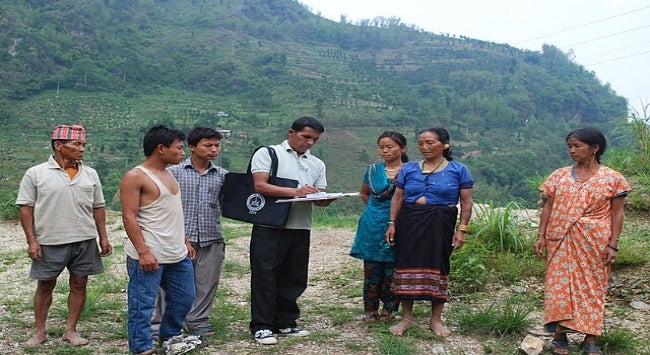Summary
The long-delayed Indian census, which will be completed in 2027, has greater political significance than usual. For the first time in independent India, caste will be enumerated in the census. The census is also likely to be the basis for the proposed delimitation of constituencies.
The Indian government has announced that the decennial census, originally scheduled to be held in 2021, will be conducted in two phases and completed by February 2027. While the census was initially delayed by the onset of the COVID-19 pandemic in 2020, the government has not adequately explained the subsequent delay for an exercise that has been unfailingly conducted every decade since 1881. The only explanation came from a Union Ministry of Home Affairs statement that said, “Covid disrupted all sectors, including education. Around 30 lakh enumerators are needed for the census, and most of them are primary school teachers. Conducting the census post-COVID-19 could have disrupted primary education immensely.”
While the census numbers are an absolute necessity for policymaking, the 2027 census has greater political significance than usual. One, for the first time since 1931, caste will be enumerated in the census. Two, the 2027 census is likely to be the basis for the proposed delimitation of constituencies. Both are intensely contested measures and have far-reaching implications.
The caste census used to be a feature of colonial-era censuses from 1881 to 1931. In the 1941 census, conducted during World War II, caste was counted, but the numbers were never released. However, in independent India, caste was not enumerated except to count the Dalits or Scheduled Castes (SCs) and the Adivasis or Scheduled Tribes (STs) though states were allowed to conduct surveys of the Other Backward Classes (OBCs) from 1961.
The Mandal Commission report, submitted in 1980, recommended 27 per cent reservation for the OBCs in government jobs and educational institutions. The recommendations, implemented a decade later by the V P Singh government, caused a political storm. The reservations for the OBCs were, however, put in place without any hard data. Subsequently, three states conducted their own caste surveys, the latest being the one in Bihar in 2023, which found that the OBCs and Extremely Backward Classes made up over 60 per cent of the state’s population. In 2010, the Congress-led United Progressive Alliance government, under Prime Minister Manmohan Singh, conducted a Socio-Economic Caste Census, but the caste data has not been published to date.
Though the Bharatiya Janata Party (BJP) government at the Centre is claiming credit for the upcoming caste census, until recently, it was against it. In 2021, the junior minister in the Union Home Ministry, Nityanand Rai, stated in parliament that the government would not enumerate castes except for the SCs and STs. The Rashtriya Swayamsevak Sangh (RSS), the ideological mentor of the BJP, too has traditionally been against a caste census.
However, the government has now done a turnaround along with the RSS. One of the reasons for the change in policy is possibly the centrality of the caste census in the opposition campaign, especially by the Congress, during the 2024 general elections, where the BJP did not perform according to expectations. In fact, Congress leader Rahul Gandhi had repeatedly stated that the BJP, if elected to power, would curtail or do away with caste-based reservations. In contrast, Prime Minister Narendra Modi had declared during the campaign that the four castes for him were women, youth, farmers and the poor.
With the announcement of the caste census on 30 April 2025, the BJP hopes to defuse these criticisms. Indeed, Union Minister for Information and Broadcasting Ashwani Vaishnaw, while announcing the caste census, blamed the Congress for not conducting it during its years in power. A more immediate reason could also be the coming Bihar Assembly election later this year, where the opposition would have likely made the caste census an issue, and where Bihar Chief Minister Nitish Kumar, an ally of the BJP, has already conducted a caste survey.
While the logistics of the caste census is challenging, given the complexity of caste affiliations in India, the policy implications are significant. One important fallout could be whether to have more targeted reservations and sub-quotas within the larger categories of SCs, STs and OBCs. Another could be the necessity to breach the 50 per cent ceiling on reservations set by the Indian Supreme Court since the OBC population is almost certainly likely to be above its current allotted quota of 27 per cent.
The second critical aspect of the 2027 census will be its possible use for delimitation. The Forty-Second Constitutional Amendment in 1976 suspended the revision of seats in the Lok Sabha (Lower House) and state assemblies until after the 2001 Census. In 2001, the Eighty-Fourth Amendment further extended to prohibit delimitation of constituencies until the “first Census conducted after the year 2026”.
The proposed delimitation has already raised hackles, especially among the southern states, which stand to lose representation in parliament if the delimitation process is solely based on population. Tamil Nadu Chief Minister M K Stalin has been at the forefront of the protests against delimitation. He has stated that the delay in the census to 2027 was a “sinister design” by the Centre to reduce the political representation of the southern states.
Both these issues – caste enumeration and the impending delimitation – make the long-delayed census more anticipated than ever.
. . . . .
Dr Ronojoy Sen is a Senior Research Fellow and Research Lead (Politics, Society and Governance) at the Institute of South Asian Studies (ISAS), an autonomous research institute at the National University of Singapore. He can be contacted at isasrs@nus.edu.sg. The author bears full responsibility for the facts cited and opinions expressed in this paper.
Pic Credit: Wikimedia Commons
-
 More From :
More From :
-
 Tags :
Tags :
-
 Download PDF
Download PDF



